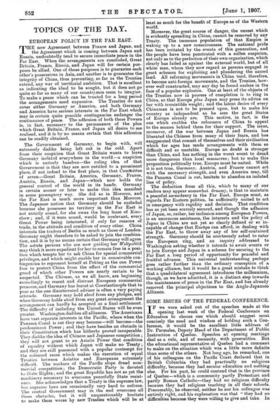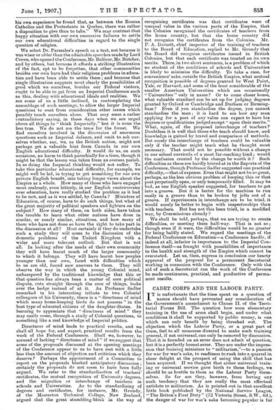SOME ISSUES OF THE FEDERAL CONFERENCE.
IF we were asked out of the speeches made at the opening last week of the Federal Conference on Education to choose one which should suggest most concisely the need and wisdom of holding such a Con- ference, it would be the excellent little address of Dr. Parmelee, Deputy Head of the Department of Public Instruction of Quebec. Speeches at opening meetings deal as a rule, and of necessity, with generalities. But the educational representative of Quebec had a comment to make on the situation which was a little more definite than some of the others. Not long ago, he remarked, one of his colleagues on the Pacific Coast declared that in British Columbia they had practically no religious difficulty, because they had secular education and nothing else. For his part, he could contend that in the province of Quebec—which is a community partly Protestant and partly Roman _Catholic—they had no religious difficulty because they had religious teaching in all their schools. Presumably, he observed, neither he nor his colleague was entirely right, and his explanation was that '• they had no difficulties because they were willing to give and take. In his own experience he found that; as between the Roman Catholics and the Protestants in Quebec, there was rather a disposition to give than to take." We may contrast that happy situation with our own successive failures to settle our own educational difficulties in 'regard to the single question Of religion.
We select Dr. Parmalee's speech as a text, not because it was Wiser or abler than the admirable speeches made by Lord Crewe, who opened the Conference, Mr. Balfour, Mr. Butcher. and by others; but because it affords a striking illustration of the fact, apt to be forgotten, that other communities besides our own have had their religious problems in educa- tion and have been able to settle them ; and because that single illustration suggests most clearly the possibilities of good which we ourselves, besides our Federal visitors, ought to be able to get from an Imperial Conference such as this, dealing with educational ideals and realities. We are some of us a little inclined, in contemplating the assemblage of such meetings, to allow the larger Imperial questicins to oust froin consideration other issues which possibly touch ourselves alone. That may seem a rather contradictory saying, in these days when we are urged above all things to " think Imperially," but it is none the less true. We do not see the trees for the forest. We find ourselves involved iu the discussion of enormous questions such as Imperial defence, and omit to ask our- selves whether. Say, we, as the British nation, might not perhaps get a valuable hint from Canada in our own English educational difficulty. It would do us, on such occasions, no harm to think parochially for a time, though it might be that the lesson was taken from an oversea parish. In so doing the Imperial thinking would not suffer. To take this particular educational difficulty, for example, we might well be led, in trying to get something for our own private English benefit, into taking longer views about the Empire as a whole. How many of those who have engaged most zealously, even bitterly, in our English controversies over education, have really studied the problem as it had to be met, and as it was settled, by Canada ? Ministers of Education, of course, have to do such things, but what of the great majority of political speakers and fighters on the subject ? How many of them, on both sides, have taken the trouble to learn what other nations have done in similar, or nearly similar, situations, and how many of them who have not done so have the right to take part in the discussion at all? Most certainly if they do undertake such a study they will come to the discussion of the domestic problems of the United Kingdom with a wider and more tolerant outlook. But that is not all. In looking after the needs of their own community they will have learnt much of the larger community to which it belongs. They will have learnt how peoples younger than our own, faced with difficulties which to us are old, found new answers to them. They will observe the way in which the young Colonial mind, unhampered by the traditional knowledge that this or that question has always been a matter of sore political dispute, cuts straight through the core of things, looks over the hedge instead of at it. As Professor Sadler remarked in his interesting tribute to two Colonial colleagues of his University, there is a "directness of mind which many home-keeping birds do not possess" in the best type of educated citizens of the daughter-States. In learning to appreciate that "directness of mind" they may easily come, through a study of Colonial questions, to something like a real knowledge of Imperial politics.
Directness of mind leads to practical results, and we shall all hope for, and expect, practical results from the work of the Federal Conference. Shall we, however, be accused of lacking "directness of mind" if we suggest that some of the proposals discussed at the opening meetings Of the Conference appear to us to have met with a little less than the amount of objection and criticism which they deserve ? Perhaps the appointment of a Committee to ' report on the proposals blocked anticipatory discussion ; certainly the proposals do not seem to have been fully argued. We refer to the standardisation of teachers' certificates, the mutual recognition of University degrees, and the migration or interchange of teachers in schools and Universities. As to the standardising of degrees and certificates, for instance, Mr. Grundy, Of the Masterton Technical College, New Zealand, argued that the great itiimbling-hleek in the way of
recognising certificates was that certificates were of unequal value in the various parts of the Empire, that the Colonies recognised the certificates of teachers from the home country, but that the home country did not recognise the certificates from the Colonies. Mr. P. A. Barnett, chief inspector of the training of teachers to the Board of Education, replied to Mr. Grundy that the Board did recognise certificates issued in British Colonies, but that each certificate was treated on its own merits. There, in two short sentences, is a problem of which no student of the conditions of schools and Universities is likely to minimise the difficulty. To take a case, for convenience' sake, outside the British Empire. what mutual recognition is possible of degrees granted by West Point, Yale, or Harvard, and some of the least considerable of the smaller American Universities which are occasionally " Universities " only in name ? Or to come closer home, what valuable standard can be set up for judging degrees granted by Oxford or Cambridge and Durham or Birming- ham? Even if you standardise the degree, you cannot standardise the man ; it is hard to see how any man applying for a post of any value can expect to have his degrees or qualifications judged except' upon their merits." What, again, of the proposed interchange of teachers ? Doubtless it is well that those who teach should know, and knowledge is gained by travelsnd comparison of methods. But surely the interchange of teachers could be valuable only if the teacher might teach what he thought most necessary. That could not he possible without a change in our school curricula of a most far-reaching kind ; would the confusion created by the change be worth it ? . Such difficulties as these are hardly hinted at in the Reports of the Conference, though Professor Sadler suggested one practical difficulty,—that of expense. Even that might not be so greats perhaps, as the less obvious problem of keeping this or that post perpetually open, or only temporarily filled. It may be bad, as one English speaker suggested, for teachers to get into a groove. But it is better for the machine to run easily in a groove than to be broken by jolts out of a groove. If experiments in interchange are to be tried, it would surely be better to begin with inspectorships than with teachers. But has not this been tried, in a modified way, by Commissions already ?
We shall be told, perhaps, that we are trying to create difficulties, or meeting them half-way. That is not so ; though even if it were, the difficulties would be no greater for being baldly stated. We regard the meetings of the Federal Conference on Education—a Conference hardly, if indeed at all, inferior in importance to the Imperial Con- ference itself—as fraught with possibilities of importance to the health and strength of the Empire which cannot be overstated. Let us, then, express in conclusion our hearty approval of the proposal for a permanent Secretariat working in connexion with the Conference. Only with the aid of such a Secretariat can the work of the Conference be made continuous, practical, and productive of perma- nent results.







































 Previous page
Previous page